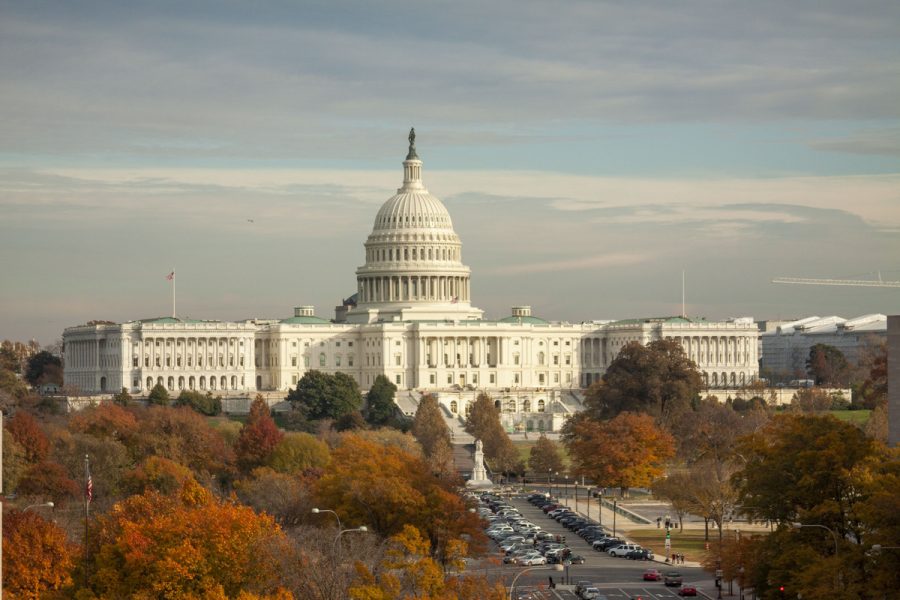Students Share Support, Hope, and Apprehension for Biden’s Climate Plan
Biden’s ambitious climate legislation could face major constraints if Republicans maintain control of the Senate.
December 2, 2020
After securing victory in the 2020 presidential election with heavy support from young voters concerned about the future of the planet, President-Elect Joe Biden has named climate change the “number one issue facing humanity,” and has plans to enact what has been described as the most aggressive plan to combat climate change of any major party nominee in history.
By making climate change one of his key priorities, Biden has shown his willingness to listen to his younger voters, many of whom view climate change as an existential crisis and have pushed for action from Biden on this issue.
Now, young climate activists worldwide and many students at La Salle who are concerned about climate change are counting on Biden to address this issue as president, and hope he will continue to listen to their feedback as they offer input on different aspects of his climate change plan.
Though more moderate than alternate plans such as the Green New Deal, the president-elect’s climate plan is considered extremely ambitious, and could face major setbacks if Republicans maintain control of the Senate. Among other goals, the plan aims to create a 100% clean economy in the U.S. by 2050 through investing over $2 trillion in creating green energy and jobs.
“Having someone in office who makes it one of their goals to fight climate change and come up with ideas to reduce pollution, I think that’s so essential,” junior Erin McGinnis said. “We need to really start working on it now, because these issues can’t wait.”
To the relief of McGinnis and other students, Biden will begin his climate plans on his first day in office, immediately rejoining the Paris Climate Accord and beginning the reversal of President Trump’s rollbacks of over 100 public health and environmental rules.
Along with numerous immediate actions Biden plans to take on his first day in office, the Biden climate plan lays out several long-term objectives and plans for the U.S.
In combination with Biden’s recommitment to the Paris Climate Accord, some additional efforts will be made to spur action on a global scale, which is one long-term goal of the plan that Biden said will involve urging every major country to increase the ambition of their domestic climate targets.
Several students at La Salle expressed hope and support for Biden’s plans to rally the rest of the world to combat climate change.
“Rejoining the Paris climate agreement will hopefully restore a sense of international allyship, and provide the U.S. a forum for collaboration and cooperation in combating climate change,” senior Paige Martin said. “The more countries involved, the more resources available, and the more potential for coming up with solutions.”
McGinnis voiced similar sentiments to Martin, emphasizing that collaboration with other nations is essential in tackling climate change.
“It’s not just us as a nation that’s fighting climate change, it’s the whole world,” she said.
Junior Isaac Shirley also agreed that “we have to join forces here.”
As well as working with other nations to address climate change, Biden has laid out major long-term targets for the U.S., including the goal of achieving a 100% clean energy economy and reaching net zero emissions no later than 2050.
“I’m extremely glad that he’s setting a goal and being like, ‘We need to get here by this time,’” said sophomore Elias Keen, who said that Biden “putting his signature down” for this target was a part of the plan that stood out to him.
Shirley said that he approves of Biden’s goal of reaching net zero emissions as a necessary first step, but he believes that Biden’s aspirations should be more drastic.
“Net zero is something that we need to do and something that needs to take effect soon, or else it will be too late,” Shirley said. “So net zero is kind of like a ‘have to.’ Our goal should be zero.”
In addition to setting several targets for emissions in the U.S., Biden aims to invest $2 trillion over four years on a wide range of environmental projects that will aid the transition to clean energy. 40% of these investments will also be earmarked for supporting disadvantaged communities.
With this major investment, Biden hopes to allocate funds to areas like public transportation, electric vehicle manufacturing, and financial incentives for people to drive cleaner cars. One predicted impact of these investments is the creation of new, clean jobs in various sectors.
Sophomore Megan Snyder, who is a member of the Earth Club at La Salle, said that the club recently reviewed aspects of Biden’s climate plan — including the job opportunities it will create — and contrasted the president-elect’s plan with the Green New Deal and other climate plans.
Snyder believes that creating clean jobs is a vital piece of Biden’s plan. “We can really help carbon emissions as a whole, and can also create new jobs,” she said. “I think that’s really important.”
Snyder also acknowledged that the cost of the investments is a part of Biden’s plan that is not widely supported, but she said that, to her, the expenses seem worth it.
“In my opinion, it’s just something that needs to be addressed, and yes, there will be a cost to it, and we may have to make some sacrifices, but it will benefit everybody in the country as a whole,” she said.
Reflecting Biden’s willingness to listen to feedback from youth and other diverse voices, many of these goals and investments in Biden’s current climate plan are more recent additions that were lobbied for by youth climate activists.
During the primaries, Biden created a $1.7 trillion plan with the goal of making the nation carbon neutral by 2050, but this original plan did not impress many young climate leaders, who compared it to the extensive plans proposed by rivals Sen. Bernie Sanders and Sen. Elizabeth Warren.
After the Sunrise Movement — a youth-led climate advocacy organization with over 10,000 members — gave Biden an “F” grade on the original plan, Biden’s campaign returned with the more detailed and ambitious current climate plan, which was created using feedback from young climate campaigners, union officials, and environmental justice leaders.
“I think that’s really great that he listened to that feedback,” Snyder said. “Because our generation [and] the younger generations are going to be living through the effects of climate change, and it’s up to us to vote in the future… to make change.”
Shirley echoed appreciation for Biden’s willingness to listen to younger voices. “I definitely think it’s a good thing that people in our generation are becoming active participants in climate change,” he said.
Like the youth activists who helped to form Biden’s current plan, many La Salle students who are worried about climate change have focused on the importance of drastic action from leaders, and have high hopes for Biden’s climate plan in creating change.
“Most recently, the wildfires that raged across Oregon and Washington were something that deeply and personally affected me,” Martin said. “I saw friends evacuating their homes during Zoom classes, remember frantically texting family members to make sure they’re okay, [and] not being able to breathe clean air. We have about a decade until the effects of climate change are irreversible. It’s not just the fate of a few trees we have in our hands, but rather it’s the fate of our entire generation’s future.”
Martin is one of many students who view climate change as an impending crisis deserving of urgent attention.
“In terms of issues the world is facing, I feel like it’s arguably the biggest just as a whole, because it kind of affects everyone,” Keen said.
Even so, “it doesn’t affect everyone equally,” he added, acknowledging that the impacts of climate change are felt and will continue to be felt more acutely by marginalized communities.
Freshman Clara Hudson agreed that climate change requires immediate action in order to avoid irreversible damage. “If we don’t do something soon, we are going to be at the point of no return,” she said.
Numerous students voiced hope that Biden will continue to listen to his youth constituents and that his climate plan will be able to create a livable future for generations to come.
“I know some people don’t necessarily agree with what Biden is trying to do with climate change,” Shirley said. “But I hope, for our future, that they will.”









